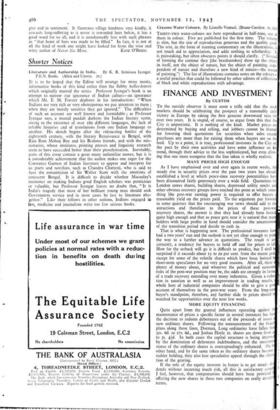FINANCE AND INVESTMENT
By CUSTOS
To the outside observer it must seem a trifle odd that the stock markets should be celebrating the prospect of a reasonably early victory in Europe by taking the first genuine downward turn for over two years. It is stupid, of course, to argue from this that the City is unpatriotic. It is nothing of the kind. Market prices are determined by buying and selling, and jobbers cannot be blamed for lowering their quotations for securities when sales exceed purchases any more than for raising them when buyers are on the feed. Up to a point, it is true, professional investors in the City set the pace by their own activities and have some influence on the trend, through their advice to the less sophisticated, but even allow- ing that one must recognise that the line taken is wholly realistic.
MANY PRICES HIGH ENOUGH- As I have emphasised over and over again in recent weeks, the steady rise in security prices over the past two years has ahead established a level at which peace-time recovery potentialities hare been discounted fairly generously over a wide field. Quotations fo London stores shares, building shares, depressed utility stocks an other obvious recovery groups have reached the point at which some thing like post-war earning power is required to offer buyers reasonable yield on the prices paid. To the argument put forwar in some quarters that the encouraging war news should add to th• attractions and therefore to the prices -of these post-w recovery shares, the answer is that they had already been hoist quite high enough and that as peace gets near it is natural that man holders with large profits in hand should consider the uncertaint of the transition period and decide to cash in.
That is what is happening now. The professional investors hay• had a two years' run and the outlook is not yet clear enough to poi the way to a further advance in quotations. The result is u' certainty, a tendency for buyers to hold off and for prices to fa How far the setback will go it is difficult to predict, but I shall surprised if it exceeds about 55 to zo per cent. from the recent pe except for some of the volatile shares which have been hoisted short-term speculators for no very good reasons. After all, there plenty of money about, and whatever the political and econom risks of the post-war position may be, the odds are strongly in favo of a trade recovery extending over many industries. Given a reduc tion in taxation as well as an improvement in trading results, whole host of industrial companies should be able to give a g account of themselves in the post-war years. From the long-te buyer's standpoint, therefore, any further slide in pricts should watched for opportunities over the next few weeks.
MORE EQUITY FINANCING
Quite apart from the general influences operating against th maintenance of prices a specific factor in several instances has bee the decision to redeem debentures out of the proceeds of issues new ordinary shares. Following the announcement of the board plans along these lines, Dorman, Long ordinaries have fallen fro 32s. 6d. to 27s. 6d., and Joshua Hoyle 2S. shares are down from 4 to 3s. 41d. In both cases the capital structure is being improN by the domination of debenture indebtedness, and the investme status of the ordinary shares is correspondingly enhanced. On th other hand, and by the same token as the ordinary shares became stabler holding, they also lose speculative appeal through the allevi tion of the gearing.
If the role of the equity investor in future is to get steady dends without incurring much risk, all this is satisfactory enoug I feel, however, that compensation should have been provided Offering the new shares in these two companies on really attractu terms.


























 Previous page
Previous page